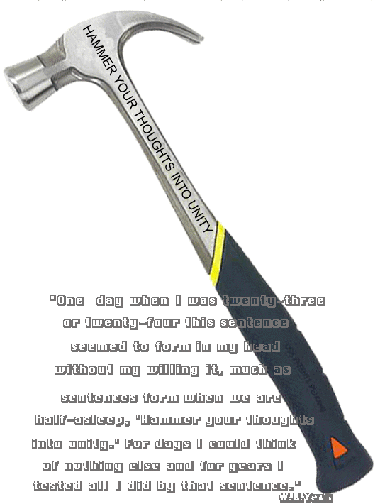
‘One
day when I was twenty-three or twenty-four this sentence seemed to
form in my head, without my willing it, much as sentences form when we are
half-asleep, ‘Hammer your thoughts into unity’.
For days I could think of nothing else and for years I tested all I did by that
sentence [...]” William Butler Yeats (cited in Frank Tuohy, Yeats, 1976,
p.51 )
Excerpts from Description of English 1-2, usually read aloud on second day of class
"….You may feel at times that you are not being taught what you ought to be taught, that your teacher does not seem to give you the answers you seek, but you actually are in a situation where no one knows the answers. …
at certain levels of education the substance of knowledge, what we are to think about, is supplied by the teacher, and the term paper, the quiz and examination, serve to measure how much has been retained by the student of what has been transmitted to him. At Amherst you will find that the burden of knowledge usually falls on the student. Thus in English 1-2 you supply for your writing your own information, material, whatever you want to call it. After all, you have received an expensive education, you have probably been taught well, you have held various jobs and have played games, and you have had your own thoughts and feelings for eighteen years, more or less. This is your ‘experience’, and from this seemingly shapeless, yet entirely individual source, you will derive whatever it is you have to say. If upon first looking at an assignment you do not immediately recognize how you should proceed, you need not be unduly alarmed, for this is normal, expected, intended. Upon reflection, however, you ought to be able to find something in your own past experience to talk about. If you wait for your teacher to tell you, you will be disappointed…..
There will be no verbal formula to memorize, and although there is, as in all courses, a vocabulary to pick up and repeat, you will within a relatively short time, a few months, a year or two, be able to say only what you can say for yourself. Whatever you learn, you learn. This goes for all formal education, when looked at from any distance.
As for your teacher, he does not exist to give you the answers. His function is to ask the questions, and if by inadvertence he should ever chance to tell you something, you should immediately turn the questioning on him. Whatever answers you reach in this course, they will be your own. You will do your own learning.”
Varnum, Robin, 1950- / Fencing with words : a history of writing instruction at Amherst College during the era of Theodore Baird, 1938-1966. / Urbana, Ill. / 1996, pp. 250-251
PE 1405 U6 V37 1996 PCL Stacks
